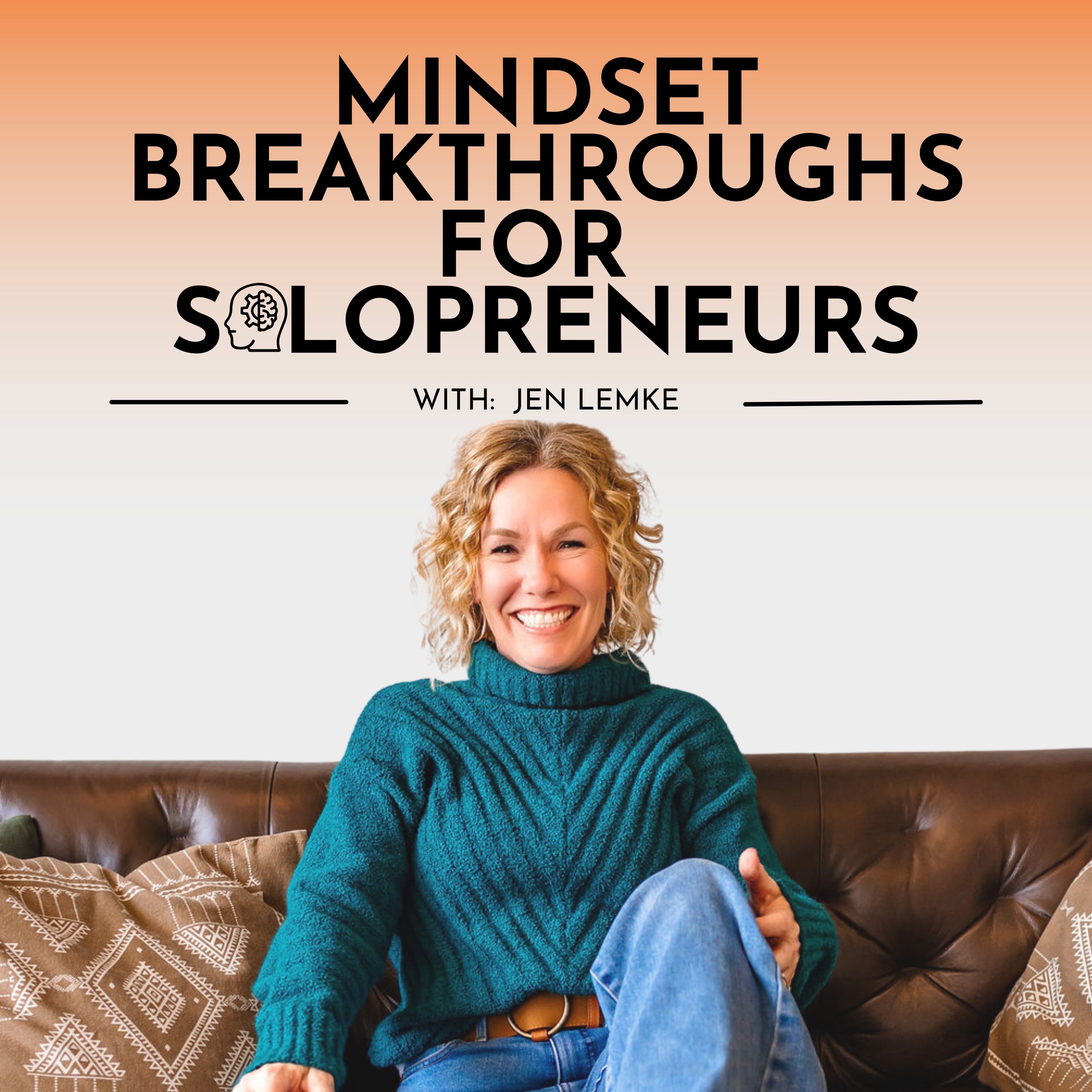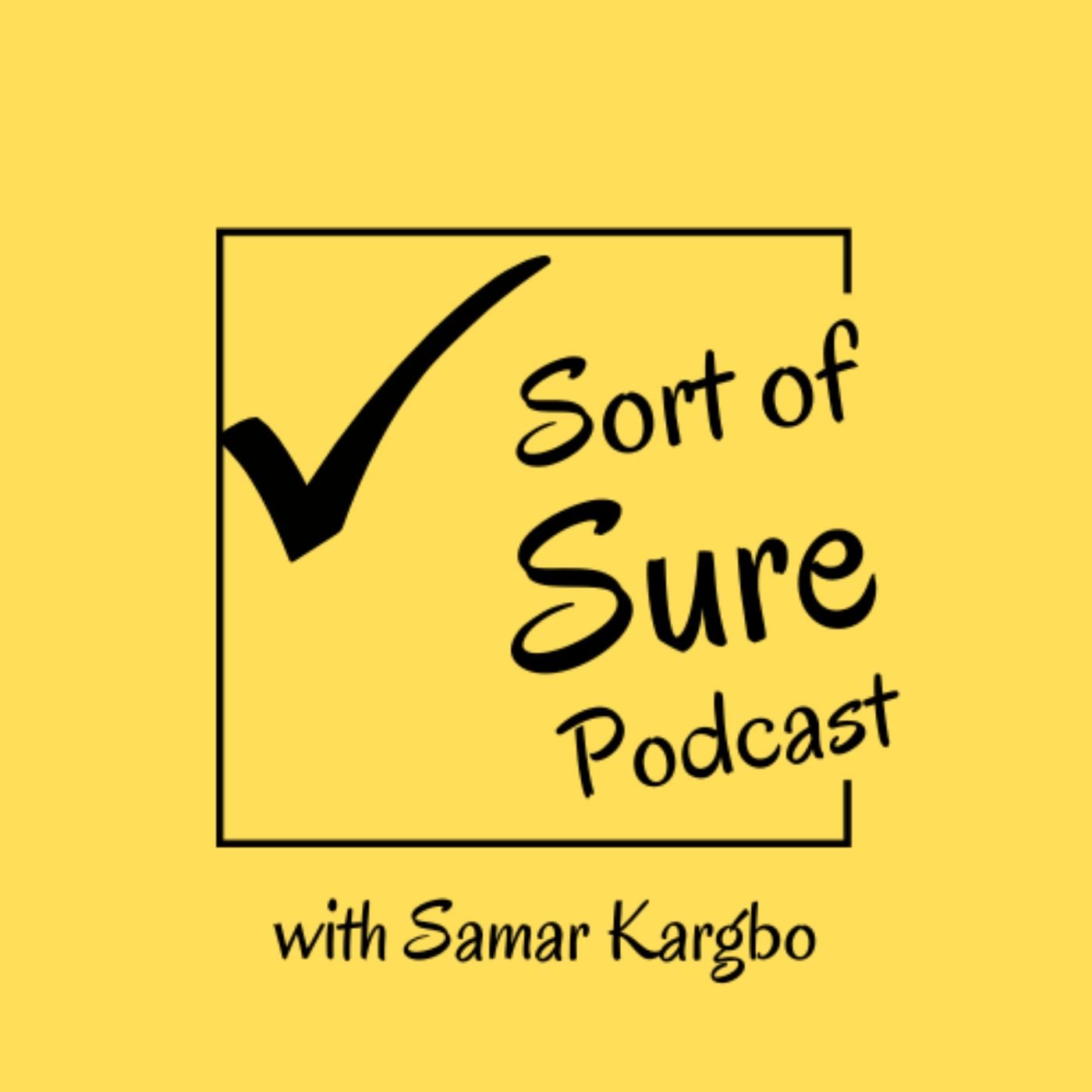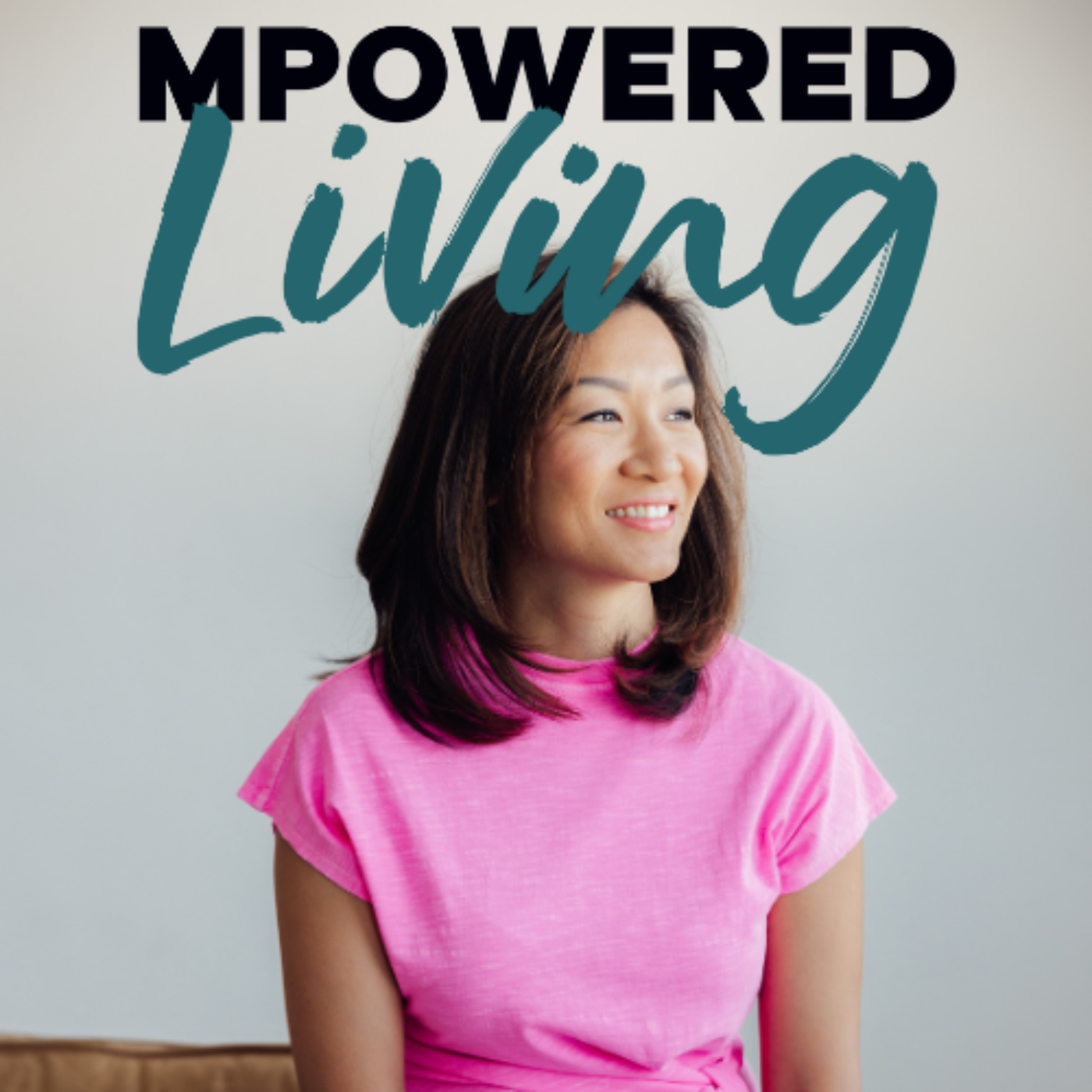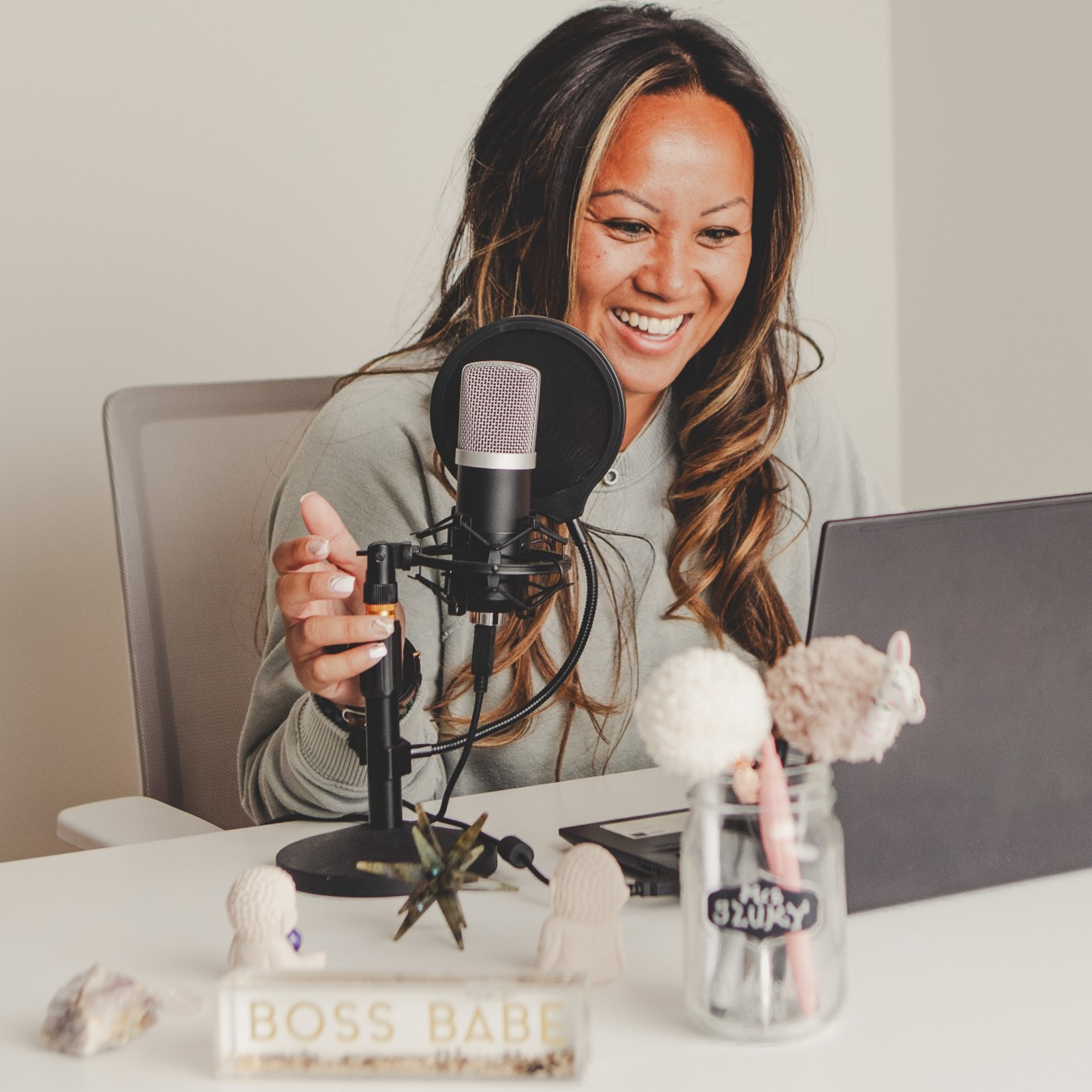
The Good Enough Mompreneur Podcast: Confidence, Mindset & Success for Mom Entrepreneurs
Are you a mompreneur struggling to balance your business growth with family life? Do you crave confidence, clarity, and success while navigating the highs and lows of entrepreneurship and motherhood?
Welcome to The Good Enough Mompreneur Podcast, where we empower ambitious, heart-centered moms to build thriving businesses without burnout!
I’m Angela Masciulli—confidence coach, Reiki practitioner, and fellow mompreneur—bringing you a powerful mix of mindset shifts, business strategies, and spiritual insights to help you step into your full potential.
What You’ll Get From This Podcast:
✅ Actionable strategies to grow a profitable business while managing motherhood
✅ Confidence-building tools to silence self-doubt and embrace your worth
✅ Real stories & interviews with successful female entrepreneurs who’ve conquered fear and found success
✅ Energy alignment & mindset work to balance business, family, and self-care
✅ Honest insights from my own mompreneur journey—because we’re all in this together!
If you’re ready to ditch perfectionism, grow your business with ease, and find more joy and freedom in your entrepreneurial journey, you’re in the right place!
🎙️ Subscribe now and join our community of inspired, empowered mompreneurs as we embrace this incredible adventure—with confidence, grace, and success! 💕
The Good Enough Mompreneur Podcast: Confidence, Mindset & Success for Mom Entrepreneurs
109. How to Recognize and Navigate Burnout as a Mom Business Owner with Therapist and Coach, Dr. Stephanie Thrower
Welcome to The Good Enough Mompreneur Podcast, where we explore the unique challenges and triumphs of mompreneurs balancing business and family life. In today's episode we're diving into a conversation with Stephanie Thrower, a coach and therapist, with a specialty in burnout, work-life balance, and creating a professional future as a parent.
Conversation Highlights:
1. Coaching Focus: Stephanie shares her insights on coaching and therapy, focusing on empowering women and moms in their personal and professional lives.
2. Understanding Burnout: We discuss why burnout is a significant issue for women and mothers, exploring its causes and effects.
3. Symptoms and Signs: Stephanie highlights common symptoms of burnout, helping listeners recognize when they might be experiencing it.
4. Navigating Forward: Learn practical strategies for navigating a path out of burnout and toward a more balanced life.
5. Creating a Professional Future: Stephanie provides valuable insights for moms looking to create a fulfilling professional future while raising a family, offering practical advice and encouragement.
Thank you for joining us on this episode of The Good Enough Mompreneur Podcast. We hope you found Stephanie's insights inspiring and practical. Remember, you are not alone in your journey as a mompreneur. Subscribe for more empowering conversations and tips, and until next time, embrace the "good enough" mindset in both your business and motherhood.
Connect with Stephanie:
https://www.throwerconsultingandtherapy.com/
Instagram : https://www.instagram.com/throwerconsultingandtherapy/
⭐⭐⭐⭐⭐Leave a Review on Apple podcasts or wherever you listen! 🎧
Thank you for listening and keep up the great work, mama!
The Good Enough Mompreneur Podcast Interview with Dr. Stephanie Thrower
[00:00:00] Welcome to the podcast, Stephanie. I am so happy to have you on the podcast and share your story and what you're doing to help moms and women in their careers. So welcome. I'm so happy to be here. I know it's been a long time coming. I'm so glad we could connect because I think you're doing really important work for moms.
[00:00:26] So why don't you tell us about What it is that you do in your therapy and coaching practice. Yeah. So I am a a licensed psychologist. I practice in the state of Massachusetts. And I have a private practice that focuses on the intersection of career in motherhood and looking at mental health stuff that comes up in those, in between those spaces.
[00:00:52] And I'm developing a coaching program that focuses on recovering from burnout for [00:01:00] women who are facing it both as parents and as professionals. And what does that look like to not just recover from burnout, but actually make that process a meaningful thing to learn on and maybe make. Changes that affect them the rest of their lives in a positive way, as opposed to a negative way.
[00:01:21] That's such important work, not only for moms, but for entrepreneurs. I did an episode a few years ago on just mental health and being an entrepreneur, and it's a problem that I think nobody talks about. Nearly enough and being an online entrepreneur, that's very lonely being a parent is lonely. So there's so much that we have.
[00:01:49] That's a challenging to us and we live very complex lives these days. Can you help us understand some of the reasons [00:02:00] why we're facing burnout? Yeah, I think that it's funny. It was doing some research on like, how did burnout come about? I can be a little nerdy. Like, how did we start setting burnout?
[00:02:16] And yeah, originally it was focused, the research and identification of the problem was focused in. Professions that were provider based or caregiver based, think really physicians and people who are really dedicated and it was there's probably like an emotional toll as well. And burnout has become much more popularized across like all fields.
[00:02:39] But I would say only recently has there been a focus on parental burnout as a different additional experience. And so it totally relates to in the workspace. burnout is this exhaustion, right? This almost this disillusionment or [00:03:00] cynicism can things work, right? And then just feeling ineffective.
[00:03:04] And I think as I think that we're facing it so much as a problem, particularly as women and moms, is we are in a culture where we expect ourselves to give. And then feel like we haven't given enough and then feel guilty when we ask to receive. And so the caregiver part really resounds, especially for us as moms.
[00:03:31] Absolutely. Yeah. So what are some of the symptoms that you're seeing? Because I think, and I know personally, there have been times where I think I was experiencing burnout, but I was just on the treadmill and not aware of the symptoms. Yeah. So burnout, it's good to know that burnout isn't actually like a medical or mental health disorder.
[00:03:58] They call it a [00:04:00] syndrome which can help. I think it can feel validating and also invalidating depending on how bad burnout feels, right? Burnout totally can be associated with depression and anxiety, but it doesn't have to be. Yeah, it's usually people feel extremely exhausted. They feel like their output is not what they expect it to be in terms of being productive or being able to organize or prioritize their, what they should be doing with their time.
[00:04:34] And like I said, I think there's this component of feeling like hopeless, but almost in a systems way. Like I think that we see that a lot in maybe outside of being an entrepreneur. I think sometimes we think we're detached from systems like, like we think we can make our own reality as entrepreneurs, but we're still super connected to things that we can get really cynical about, so [00:05:00] yeah, those are some symptoms. I think feeling drained goes with that exhaustion. And I think as a parent, we also feel like it's hard to feel connected, like not just not being emotionally available, but almost detaching a little bit. Yeah. Yeah. I've heard too, that especially as a caretaker, there's an aspect of burnout that can be characterized by a lack of sympathy for who you're caretaking for.
[00:05:35] So I think That and that kind of goes along with that disconnection. So I think that's a really important sign. If you're in a situation where. You're not feeling as empathetic as you might have at one point that, that might be a sign that you need to like make some changes. Oh, I feel like there's, I think what people, moms [00:06:00] get really frustrated with is like snapping, being frustrated or angry with their loved one.
[00:06:06] Yeah. And being shocked by that. By it coming out, because they push that exhaustion down so much. And then it's they ordered the wrong thing and, or the wrong thing came in the mail. Straw. And yeah, I think part of that is like disconnecting from their empathy or their ability to like pivot.
[00:06:25] And we're having to do that all the time, all day. And that is tiring. So can you help us figure out the steps to take forward if we think we're experiencing burnout? And of course, talking to somebody like you is definitely a great recommendation, but maybe some of the simple steps that we can do to adjust our lives.
[00:06:58] Yeah, I think that I [00:07:00] think that those beginning steps are really hard to address burnout. They're really the hardest, right? Because I think we want to do two things. We want to start implementing self care. And that feel like when we feel really crappy, that can feel like a big lift. And the other thing that I ask people to do that's hard is to start identifying what matters to them.
[00:07:24] What are their values? And we do that in the process of recovering from burnout. So it does shape and get more clear along the way, but without purpose and meaning, I think that burnout recovery can be super temporary. It's almost like that vacation where we're like, Oh yeah, I'm just going to get away and escape.
[00:07:47] Or I'm just going to sleep for 10 hours and all of this will go away. But burnout is usually related to something deeper, something about how we're not living in alignment with our values. That's really [00:08:00] interesting. Can you explain that more for listeners? Because I think that there is this, I think there is more of a focus on the surface level of Oh, you're just tired.
[00:08:15] So you need to self care and rest more. But what is that been beneath the layer of self care? What does that look like? Yeah, so I think for the most part. Research shows time and time again, that it matters to humans to have fine meeting and purpose. And that sounds really ominous and grand. And like we are going on some kind of giant journey and actually is not, it's much more every day than that.
[00:08:50] I think we're very much used to like society telling us what matters, but it can be a tough switch to be like, Wait, what do I actually [00:09:00] care about? And the more we do that research shows, the happier, the more content, the more psychologically they call it flexible, but resilient. We can be when we face inevitably hard things.
[00:09:15] That's what being a human is. And so oftentimes when there's a disconnect between I value these things, ABC. And yeah, it's something about my business is having me do, the EF, and I'm feeling like there's not enough alignment, or it feels like it's very much competing or there's potentially things where we're struggling with how we prioritize our family at certain times.
[00:09:48] One example I'm thinking about is. Right now. Cause I'm, I own my own business. I'm not the sick parent, which means I'm not like if my kids are sick because my husband [00:10:00] has sick time, like it makes more sense because I need to see, I need to like do earn money. And if I not present, then I don't have that time.
[00:10:10] I'm not, sometimes I get I'm not sure that's totally in alignment with my values about what I want to be as a mom. I don't want to always to be him, which is it's a gift. It's wonderful. There's some kind of rub for me about that. And sometimes you don't do anything about it sometimes, but like just recognizing that disconnection is happening.
[00:10:33] It can be helpful. Yeah, there's some things, I hear what you're saying, because there are some things that I like to personally do. I personally like to drop my kids off at school and pick them up. That's just, I, it's like a non negotiable for me, for the most part. And if there's some reason that I can't do that, it definitely [00:11:00] It doesn't sit well with me, but there are times that my husband might have to go because I'm at an event or something like that.
[00:11:08] But there are rare occasions, but I know that's a priority for me. So I schedule around that and I let everybody know during this time and this time, this is what I'm doing. And I love that you bring that up because it's, I think oftentimes we compare what matters to us with others. And that's the biggest problem is that we actually aren't, I, this is like the other nerdy part of, I love searching for values with people, like hearing their stories and going someone uses the term like truffle hunting, like going truffle hunting for these things that, really drive our repeated behavior for good and bad, like these things that we're trying to figure out in life about who we are and what fills our mom cup, what like fills our values as moms they're also different from one another.
[00:11:59] [00:12:00] And I like naming that and honoring yeah, that's your, that, that is the thing that feels like it feels you're nourishing as a mom to be like, I'm picking them up. I'm the one there. Yeah. And what has come up a few times on the podcast too, is really the importance of talking to your children about what's important to them.
[00:12:23] Because sometimes those 2 things are not in alignment or you're trying to do something really hard. That's not important to your children and you're like, really stressing yourself about it. I've heard that happen too. I think that is another great step, especially if you're feeling really stressed, checking in with our customer, our kids and our spouses or partners and going, okay, this is really stressing me out or.
[00:12:52] Is this important to you? And I found that approach is really helpful too in trying to find some of that [00:13:00] alignment we so desperately seek.
[00:13:04] Yeah. I think like assuming what matters, like oftentimes either like society saying something is important or just assuming for other people, like that I should be supporting you in this and then being like, actually. If I'm thinking about a client, like someone telling me, no, I really like this part of the work we're doing, these other parts that I might be misperceiving is important.
[00:13:29] Yeah. Especially if it's causing you stress or you see it's causing your children's stress. As moms, I've seen, I've been on the receiving end of I wish my mom would pick me up. And the fact that their parents don't prioritize that. Is like an issue, too, and it causes some stress. I think not only as parents, sometimes our kids don't want to add to our load and.
[00:13:56] voice how they feel sometimes. So [00:14:00] I try to keep that in mind and just ask them, how's this going? I don't know. You don't seem so happy after school or when I see you or, so yeah, I think that's a great. That's really interesting. And so what do you think is blinding us?
[00:14:20] And that we think is our goal, like, when we're on that burnout treadmill, when we're not working aligned with, our purpose. I think perfectionism, martyrdom, and maybe all patriarchal things, right? I think that, I think part of the difficulty is, we're rewarded and maybe socializes women to be the givers and the supporters.
[00:14:52] And I think that part of it is like, Oh, this, what is, what makes me a good mom, right? [00:15:00] Oftentimes like we see, like it's being supported to try to be that perfect mom. And that perfect mom has so many different competing messages. And I think the icing on the cake is denying that it's true is being like, Oh, this is simple, right?
[00:15:17] Or not or tending to invalidate that the load at home tends to be unequal, right? I think that oftentimes, and if we try to bring it up, especially if we're married to men, It can be hard because we, we are not used to communicating some of those inequalities, or maybe we even think it's going to be more difficult than it is, because I've assumed that a lot and I won't say something because I anticipate a certain reaction.
[00:15:49] I know my husband does that as well and it's I think after a couple of decades, we finally just. Say it, but, it shouldn't have [00:16:00] taken that long. And it's, I can't tell you, I don't know if this has changed for you, but I think asking for help has been a thing. I continue, I start to bring it up and people are like, just recoil.
[00:16:16] Yeah, and I loved it. There was a guest on the podcast who, when she makes a speech, she says, raise your hand if you like helping others and everybody raises their hand. And then she says. Raise your hand if you like asking for help and crickets, it is really hard as women to ask for help, but we absolutely need to start normalizing that.
[00:16:45] Yeah. And I don't think that I don't, I think burnout recovery, that's like more lasting, not possible without others help. Like it doesn't have to be a professional, but. I [00:17:00] think that because I think compassion lights the path out of burnout, that's hard, yeah, that's hard to generate off the bat for Brent out.
[00:17:16] The last thing we want to do authentically is be like, is to grow that self compassion Yeah. And I think for a lot of people that kind of inner critic is what has kept them on the burnout treadmill for so long. Oh my gosh. Yeah. I mean that inner critic, I'm like not all against it. I think it's more complicated.
[00:17:44] Like meaning, I think that excellent, like we get to a point of excellence because of critical thinking. Yeah. Yeah. It is involved in all kinds of things we do in life, right? Like I was an ex athlete and [00:18:00] my, me being critical about how things felt or what it looked like as a gymnast, of course. I, that was a part of how I did well, or learn new things, right?
[00:18:12] So I don't, I can't throw that away. I don't want to, but yeah, like I think when you're burnt out, that critic just keeps digging, right? It's not productive at all. I love that you use that word, excellence. Because so often I've heard people say I'm a perfectionist because I think things should be done well.
[00:18:39] But there is a level of excellence that you can strive for that is healthier than saying, I'm a perfectionist. It leaves that gap for self compassion. It leaves that space to, still be [00:19:00] human. Julie, I think that there's a difference between excellence and neuroticism.
[00:19:11] And yeah, I think this if all I cared about was, the going off of that gymnast theme, like if all I cared about was not falling off the beam ever like I would just be focused on that metric versus Oh, in practice, I almost fell off several times and learned how to regain my balance.
[00:19:29] And that's where the learning happens. It's in the falls, it's, and that's where the growth happens. Like perfection, perfectionism, just to stay protected and invulnerable. There's no growth in that, yeah. And then, there's a certain amount of external validation in that too, right?
[00:19:57] It's, if you're constantly seeking [00:20:00] that gold star and. Conditioned as so many of us, especially women are to be people pleasers and to take care of everybody and be responsible for everything and everybody around us. Yeah, that's so problematic. Yeah. I get it and it can be, I think I've had some clients say how hard it was for me to ask them, what do you care about?
[00:20:31] Like what matters most to you, because I think that it just felt of the first times they've been asked that question, they're used to going into all these spaces and fitting in perfectly what the, the interviewer wants or the client wants, as opposed to what actually matters to me, that's just really makes me just pause for a minute because that's just, [00:21:00] that makes me so sad, but I know, I've been there. I've been, I think at some point we're all there. And then especially when you have really little ones who need you for so much and you're just constantly caretaking, it's easily to get, it's easy to get stuck in that mode where, it's like you approach everything in your life, the way that you have to care for your children's every need almost.
[00:21:28] Yeah. And babies are tough. That's a tough way to come into parenting. Yeah.
[00:21:38] The feedback is, all over the place, but it's very hard to know as opposed to a lot of other places where we achieve motherhood or parenting, you don't, there's very few experiences where you're like, I did that so good. Yeah. And, also there's not a lot of gratitude or things, it's [00:22:00] yeah, your kids alive, I guess like when they're 40, they'll tell you.
[00:22:07] They finally get it when they have to do the same thing in their life and go, Oh man. Yeah, it is not. Yeah, it's not a reciprocal relationship. And so it's very. Very fuzzy to know if you're doing things right. I remember like when I had my first, I was like very focused on getting breastfeeding. Figure it out. And I think it was just this tangible thing to prove I can do this motherhood thing. I think like those are the places we get so stuck because there isn't that clear feedback that I'm doing things right. There's a lot of, we can look for a lot of evidence that we're not doing things well, yeah. So it sounds like having A conversation with ourselves about what is really important to us and figuring out our [00:23:00] values and our non negotiables is an important first step in finding more balance to either prevent or emerge from burnout, but what are some other tips that you might have for listeners to help with the burnout?
[00:23:18] Totally. Yeah. I think that Like the values thing is a heavy lift. And I think that, that is, that's like a life long process to be true. Yeah, it is ever changing. Yeah. I think that finding out what works for you, self care can be such a heavy, loaded term.
[00:23:41] Yeah. So I think there's a solid, there's a really good book on burnout by Emily Nagoski and Amelia Nagoski, they're sisters, and it's actually focused on burnout. Like women's process of burnout recovery, we talk about they focus it on like [00:24:00] completing the stress cycle. And this is, so it's in the self care world, but like knowing, acknowledging that we're actually going to face stress as humans and how do we complete the stress cycle by actually, so we're stressed.
[00:24:16] Like something like movement can help us. Our bodies start to understand we're no longer in threat. We don't need the cortisol. We don't need the adrenaline, but like our bodies think that something is a threat because of the stress, but it's actually not. So there's they talk about movement and sleep and laughing and crying and affection.
[00:24:38] So there's, I think framing it as. Because I think exercise in itself can be going that perfectionistic, but yeah, and a lot of people don't realize like they often think, Oh, I'm going to go exercise. So I'm going to go for a run, but that also can be cortisol inducing. Yeah. I think it's got, [00:25:00] most people can figure out some kind of way where men can be like.
[00:25:06] Where we can recognize like, Oh, that 10 minute walk really did change something about my stress. Feel it in my body. But movement's not the only thing either. And I think people being. putting the judgment outside for a minute and actually tuning into what helps me recover from stress that's going to happen every day.
[00:25:33] Yeah, I think that's so important because for a long time, I Just like we do so many things, we co sign or create this idea of what we're supposed to be or do and what works. And I kept approaching these so called self care things with, it works for everybody, right? And it wasn't working for me.
[00:25:55] Going out with the girls was not self care for me. It was like [00:26:00] Stress inducing. It was like, but quiet time, honestly, just doing nothing for me is like such a luxury. Yeah. I think that I think being still is obviously in some kind of way for many reasons, like first it helps us know what we're feeling or start to learn what we're feeling.
[00:26:24] The other piece is we are so overstimulated by constant distraction. And I think particularly as an entrepreneur, that's not talked about enough. I guess it is like in the, like the deep work kind of research, like the writing about that, but being an entrepreneur and doing so many different parts of work, you are like distracted by this, that distracts you by this, that distracts you by this. Yeah, I'm a podcast junkie. So I'll work and I'll go pick up my kids and listen to a podcast. And I've started to [00:27:00] realize that I need to stop doing that. Cause my brain is still. Like a learning and working and trying to pick up every little piece of information.
[00:27:11] It's on high alert. And I'm like, I've just got to listen to the radio or just put on classical music or something that is more relaxing than listening to more conversation. Yeah. I think that people naturally make sense might avoid stillness. Because unpleasant feelings come up, right? Especially if you're burnt out, you're like, Oh, I don't want to feel all those feelings.
[00:27:40] But I think part of what we forget is that we're carrying them around. And the more we push away feelings, the louder they get. So I think. Feelings. Yeah, feel and that's part like that's part of the work for sure is to just practice and [00:28:00] with people or with loved ones like practice. Allowing all the feelings.
[00:28:04] I think our kids are helping with that because there's such a movement for them to want to teach them to allow their feelings. I think it is only very recent where they've started to educate parents about not telling kids to suck it up and to be like, okay, all right, this is tough.
[00:28:29] Give yourself time to cry. Let's take some deep breaths. And then when we're calm, we'll try to take a different approach or whatever. But I think I've heard that this is really helpful that if you in those calm moments, you don't feel comfortable being still. Just do it in baby steps, do it a minute at a time that often we try to it's all or nothing.
[00:28:58] I'm doing the 30 minute [00:29:00] meditation or I fail.
[00:29:05] Absolutely. And I think think that there's a way to understand and to prep to play around with all kinds of mindfulness. If I'm going for a walk and I'm going to do five minutes without listening to a podcast, right? Or whatever. Just, and I think that for a lot of people, oftentimes it's either It's if you close your eyes and I tell you to imagine a pink elephant, you can write.
[00:29:30] And I think for people there, it's their internal dialogue or the internal things they see. And sometimes it's like physical pain. Those are the three things that tend to distract them in the process. And so for me, when that's happening, I really like to focus on. If it's what I'm hearing, then I focus on the sounds, right?
[00:29:53] I focus on something outside of what's happening in my mind to practice. So that I'm [00:30:00] not following the inner thoughts as they go along and long, yeah, I think I've heard there's a technique where you name five things that you see, touch, smell, hear to ground you in the moment. So I could see where that could be very helpful to be more present because I think that's ultimately the goal of the stillness or, and that's isn't that kind of the opposite of burnout, where we're just going and going to achieve who knows what.
[00:30:39] I think burnout, the opposite of I think what, when I think I'm trying to think of the spectrum of burnout, I think that, yeah, regaining like creativity and excitement. And and I think that stillness, if we're constantly flooded with information, constantly processing, and I think burnout really drives this [00:31:00] Just keep going, keep driving.
[00:31:01] It's if you were ever been on a long distance drive, right? It's no, just keep going to the next, just keep going. And I, you don't need to sleep, but it'll be better the next day. And I think burnout. Long term burnout really feels like that. I'll get some kind of dopamine lift, just keep going.
[00:31:19] But then creativity is starting to suck away, right? Your prioritization is starting. You're just becoming less and less effective. I think that's a really great way to, end this conversation. And if you're wondering, do I have burnout? That sense of loss of creativity and excitement is such a hallmark of because if it's not fun, if it's, you're not feeling that excitement that you once did, It's definitely a sign.
[00:31:55] Well, Stephanie, thank you. It's been wonderful. I think it's such an important [00:32:00] conversation and we could go on for so long. It's so important. I love that you're doing this work and that we connected. So you could be on the podcast if you want listeners to have a takeaway from this conversation that sticks with them.
[00:32:17] What would that be? I think that I want people to know that burnout recovery is not only very possible, because I think sometimes we can feel resigned to just doesn't everyone with kids under five feel burned out all the time? So I want people to know that we can recover from it, but we also can prevent it.
[00:32:40] And it doesn't just have to be this hurdle or scary thing in life. It can. Be the message that something needs to change, that that's something about the way that we're working or parenting needs to shift. And this is a hard, but wonderful opportunity to [00:33:00] try to make that change.
[00:33:02] And I say that just being able to have witnessed that across so many women I've worked with. And that is the gift of my work, but it's also just knowing that it's totally possible, yeah, and I love that. I've worked with therapists who talk about how your anxiety, your stress, it's a messenger.
[00:33:21] And so I think that's a great way to put that in. Like we have a tendency to beat ourselves up for being tired and we're so bad to ourselves. But yeah, in that it is normal. It is like something that we all find ourselves in. And, but there is hope to change and to change long term. And not only ourselves, but I think burnout.
[00:33:49] Yeah. In. So connected to some of the oppressive systems we live in. And so part of what can be really helpful is making change in the world. [00:34:00] Sure. And I think being a part of that, yeah, that can lift us up and be like, okay, like it's not so hopeless. Some of them. Yeah. Yeah. I think you and I are both actually making that change and redefining what it's like to be a working mom and that we don't have to go in an office.
[00:34:17] We can run businesses and be home and parent the way we would like to, but still, offer our. Professional skills to the world. So I appreciate that. Thank you so much, Stephanie. Where can listeners connect with you and learn about more about you? They can find me on Instagram at coaching with Dr.
[00:34:39] Thrower, my handle. And then I have the same website coaching with dr. Thrower. com. I love it. Thank you so much. It's such a great conversation. Thank you.
Podcasts we love
Check out these other fine podcasts recommended by us, not an algorithm.

Living the Reiki Life
Kristi & Amanda
Awakening to Abundance
Abundance with Athena
Angry At The Right Things
Bronwyn Schweigerdt
Mindset Breakthroughs for Solopreneurs
Jen Lemke
Sort of Sure Podcast
Samar Kargbo
Mpowered Living with Ann Sheu
Ann Sheu
Mending Families
Melissa Pemberton
Rebel Energy
Jade Elsberry
The Mending Trauma Podcast
Dr. Amy Hoyt & Leina Hoyt, MA
Life in Focus with Sandy Grigsby: Personal Branding, High Performance, Confidence, Self Worth, Entrepreneurship
Sandy Grigsby | Brio Five, LLC | www.briofive.com | www.sandyinfocus.com
The Carol Szuky Podcast
Carol Szuky
Project: Mom Podcast
Emily Gorrie
Podcast Launchpad with Angela Kelly Smith
Angela Kelly Smith
The Rainmaker Family Show | Build Your Family Business
Chelsey & Stephen Diaz
Quantum Mindset with Gail Allen
Gail Keyes-Allen


